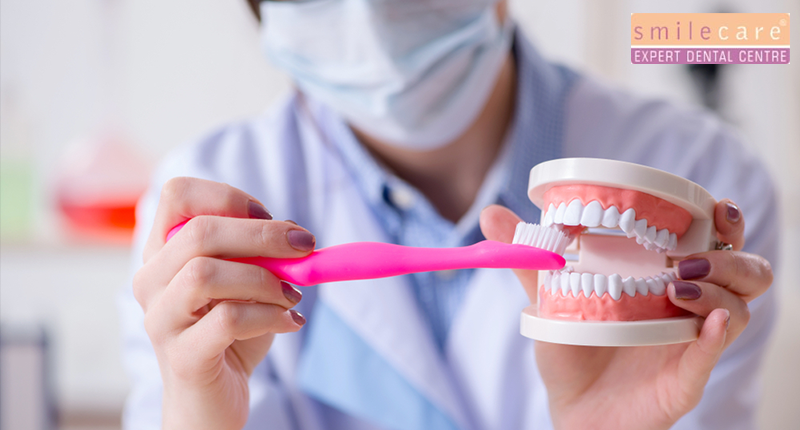Oral hygiene is an integral part of overall health and well-being. Neglecting your dental health can lead to various oral problems affecting your teeth, gums, and overall health. Dental issues like cavities, gum diseases, bad breath, and tooth loss can be prevented by taking good care of your teeth and gums. Let’s discuss some tips on how to maintain good oral hygiene.
1. Brush in the morning and before bed:
Brushing your teeth twice a day is important to maintain good oral hygiene, but the timing of your brushing can also make a difference. Brushing in the morning helps remove any bacteria or plaque that may have built up overnight while brushing before bed removes any food particles or bacteria that have accumulated throughout the day.
2. Flossing Daily:
Flossing helps remove plaque and food particles between your teeth and gums that your toothbrush can’t reach. Use a floss about 18 inches long and wrap it around your fingers by following a good oral hygiene procedure. Gently insert the floss between your teeth and move it up and down. Be sure to floss all of your teeth.
3. Use mouthwash:
The benefits of teeth cleaning with Mouthwash can freshen your breath and kill bacteria in your mouth. Use an antiseptic mouthwash that contains fluoride to help prevent cavities. Swish the mouthwash around in your mouth for 30 seconds, then spit it out. Don’t rinse your mouth with water immediately after using mouthwash, as this can reduce its effectiveness.
4. Replace your toothbrush regularly:
Over time, the bristles on your toothbrush can become worn, frayed, and less effective at removing plaque and debris from your teeth and gums. Using an old or worn toothbrush can also harbor bacteria and germs, which can lead to infections and other oral health problems.
To ensure that you’re using a clean and effective toothbrush, it’s recommended that you replace your toothbrush every three to four months or sooner if the bristles begin to fray.
5. Avoid smoking and excessive alcohol consumption:
Smoking and excessive alcohol consumption can lead to oral health problems, such as gum disease, tooth loss, and oral cancer. Quitting smoking and reducing alcohol consumption can improve your overall health and your oral health.
6. Limit sugary and acidic foods
Sugary and acidic foods and drinks can erode tooth enamel and lead to tooth decay. Limit your intake of sugary and acidic foods and drinks, such as soda, candy, and fruit juice. Opt for fresh fruits and vegetables instead.
7. Visit your dentist regularly
Regular dental checkups and cleanings are essential for maintaining good oral hygiene. Your dentist can check for signs of cavities, gum disease, and other dental problems and provide treatment if necessary. Your dentist can also give you oral hygiene tips for improving your oral hygiene routine.
By following these oral hygiene instructions, you can ensure that you’re brushing your teeth effectively and maintaining good oral hygiene. Don’t forget to schedule regular check-ups with Smile Care and a dentist to keep your teeth and gums healthy!
FAQ
1: What are some tips for maintaining good oral hygiene?
- Brush your teeth twice a day: Use a soft-bristled toothbrush and fluoride toothpaste to brush your teeth for at least two minutes each time, making sure to reach all surfaces of your teeth and your tongue.
- Floss daily: Flossing removes food particles and plaque from between your teeth and along your gum line that your toothbrush can’t reach.
- Use mouthwash: Mouthwash can help kill bacteria and freshen your breath, but it should not be used as a substitute for brushing and flossing.
- Limit sugary and acidic foods and drinks: Sugary and acidic foods and drinks can erode your tooth enamel and lead to cavities, so it’s important to limit your consumption of them.
- Visit your dentist regularly: Regular dental check-ups and cleanings can help detect and prevent dental problems early on.
2. Why is oral hygiene important?
Poor dental hygiene can lead to problems that are much bigger than an unpleasant smile. Tooth decay and gum disease can affect other parts of your body, including your heart. Why is it important to practice good dental hygiene? Good oral/dental health translates to good health overall.
3. What is the golden rule for oral hygiene?
Brush your teeth twice a day with fluoride toothpaste. Clean between your teeth daily using floss or interdental brushes. Eat a healthy, balanced diet and limit added sugar intake. Visit the dentist regularly for check-ups and preventative care.
4. What are the 5 good oral habits?
Therefore, a dentist is sharing six good oral health habits to start today!
#1. Always Brush Your Teeth Before Bed. …
#2. Don’t Neglect Your Tongue. …
#3. Use Mouthwash Regularly. …
#4. Drink Plenty of Water. …
#5. Implement a Vitamin-Rich Diet. …
#6. Visit Your Dentist Twice a Year for Checkups
5. How do you maintain good oral hygiene?
Practice good oral hygiene. Brush teeth thoroughly twice a day and floss daily between the teeth to remove dental plaque. Visit your dentist at least once a year, even if you have no natural teeth or have dentures. Do not use any tobacco products.

